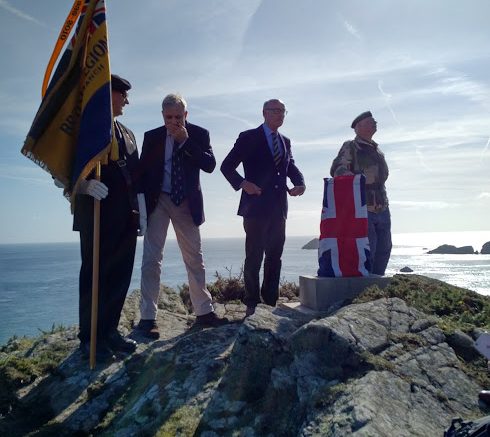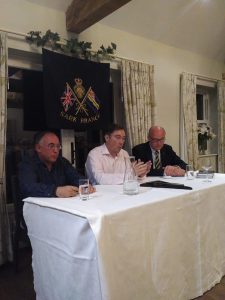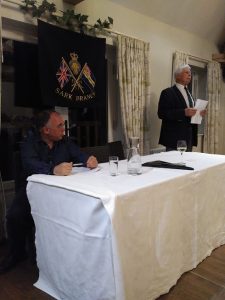This is the text of a speech I gave at Stocks Hotel, Sark, 3 October 2017, the 75th anniversary of the British commando raid on the island.
It has been three quarters of a century since a dozen or so British commandos landed on this island in the raid known as “Operation Basalt”.
Tonight we honour their memory. But this is also a good opportunity to reflect upon not only what happened here on the night of 3-4 October 1942, but also upon how that story has been told.
I want to talk this evening about how the Nazi German government began telling lies about this raid from the morning after, why those lies and were told and most important, I think, why they were believed. And I want to conclude with some reflections on the importance of historical memory.
But first, let me review what happened here, actually only a few metres away from where we are meeting right now, on that October evening.
The German occupation of Sark was, first of all, an illegal occupation, part of an illegal war. At the Nuremberg trials at the end of the Second World War, a number of key Nazi party officials and German army officers were accused not only of the famous war crimes and crimes against humanity, but also of the initial crime of starting an illegal war of aggression.
The Second World War, unlike the First, is not one in which merit can be found on both sides. Germany and its allies, primarily fascist Italy and imperial Japan, launched unprovoked aggression against their neighbours. The first victims were the Chinese, then the Ethiopians, and finally the Poles. By the time the first German soldiers set foot on Sark in 1940, their armies had invaded and conquered nearly all of continental Europe. The only parts of Europe which were not yet occupied by German forces were a handful of neutral countries including Sweden, Switzerland, and Spain, as well as countries which were allies — at the time — of Hitler and his Third Reich, most notably the Soviet Union.
In the decades since the war ended, there has been a bit of a debate about the nature of the German occupation of Sark and the other Channel Islands. The term “model occupation” has been used to describe an effort by the Germans to attempt to persuade the local populations in the Channel Islands — and by extension, the British people in general — that ending the war on German terms with a British surrender would not be so terrible.
It is important to lay that term to rest, to bury it and never use it again, because it conceals the reality of the German occupation, which was not only illegal but brutal from the beginning. This was no “model occupation.”
I’m going to jump slightly ahead of myself here to highlight just one fact which, I think, exposes the reality of this “model occupation”. Long before the British commandos landed here on Sark, the Germans had already deported some 2,000 innocent civilians from the Channel Islands to camps in Germany. This illegal deportation, which was confirmed as a war crime by the Nuremberg court, *preceded* the raid. It was not *a result* of the raid.
And those deportations from Jersey, Guernsey and Sark were not the very worse thing the Germans did. The worst thing they did, in my view, was their decision to extend the Final Solution — the Holocaust — to these peaceful islands.
There were only a few Jews living in the Channel Islands when the Germans arrived in the spring of 1940. But they were treated no differently than those Jews who lived in far greater numbers in places like Poland.
In the eyes of the German Nazis, the Jews were a virus, and needed to be exterminated for the health of the Aryan race. The occupiers demanded of the local governments in the Channel Islands that they turn over the names and details of all Jewish residents.
To their shame, they did. A number of innocent Jewish civilians in Guernsey and Jersey were arrested, and shipped off to the death camps of eastern Europe where they were murdered. The local officials in Guernsey and Jersey, who were accomplices to this crime of murder, were never punished.
On Sark, the Germans grew to suspect one woman of possibly being Jewish. Her life was somehow spared, and some attribute this to the intervention of the Dame of Sark, who was her friend. If true, that is to her eternal credit.
I say all of this to make it clear that by the time Winston Churchill decided to unleash the Small Scale Raiding Force on Sark in October 1942, they came as the representatives of civilisation to fight against a barbaric enemy who thought nothing of slaughtering millions of innocent and defenceless people.
The raiders that night were a mix of two units, some from the Small Scale Raiding Force, led by Major Geoffrey Appleyard, and a contingent from a group known as the “Irish Commando” led by Phillip Hugh Pinckney. Unfortunately, there is no certified list of who actually participated in the raid, and the names we’ve agreed to put on the memorial stone on the Hog’s Back are the ones we are certain were there. But if we don’t know who they all were, we do know what they came here to do. Their mission was clear even if little understood at the time by many of the local population, or later by some historians.
It consisted of this:
Land on Sark. Find enemy soldiers. Capture some and bring them back to England for interrogation.
Why was this important? Because the British government and army knew very little about conditions not only here in the Channel Islands, but in occupied Europe as a whole.
What kind of defences had the Germans erected? Of what did Hitler’s infamous “Atlantic Wall” consist? What was the situation of the local populations under German rule?
Remember that 75 years ago, there were no satellites, no drones, and even aerial reconnaissance was rarely very accurate.
People on the islands were unable to communicate with their family members or anyone else in England.
The Allies knew almost nothing about the situation on Sark and the other Channel Islands — except that Germans were here.
Their intelligence was so poor, that they were told that a German machine gun emplacement was located on the Hog’s Back when it fact it turned out to be a very old cannon, which is still there.
When the commandos landed on that October night, they actually struggled to find those Germans.
They thought they spotted some on the Hog’s Back, but it turned that these were just targets.
They moved toward their primary target, Petit Dixcart, and found it empty.
Time was running out when they stumbled upon Mrs Pittard, awakening her and leading her to exclaim — finding herself surrounded by men in uniform, their faces blackened — “Is there a fire?” She assumed they were firemen.
The fact that she told them exactly where to find Germans — over by the Dixcart Hotel — makes her, in my eyes, a real heroine. But in addition to that, she gave the commandos valuable information about life under the German occupation. It was because of her, and the newspapers she passed on to Major Appleyard and his men, that we know about the deportations from the Channel Islands to Germany which preceded the raid.
The rest of the story is, I hope, familiar to you.
One of the commandos, Anders Lassen, managed to neutralise the German sentry, and they went on to capture a group of sleeping German combat engineers. These men were caught without their weapons, some of them stark naked, and they were marched out into the night. What happened next is a matter of some controversy.
It appears that the Germans were expecting a much larger force, and when they realised that fewer than a dozen soldiers had captured them, some began to fight back, to scream and shout, and to run away. Stocks Hotel, which is where we are right now, was only a few metres away. There were many heavily armed, battle hardened German infantry right here who could have come to the rescue of the combat engineers.
Had that happened, the raid would have been a disaster, with the British soldiers captured or killed by an overwhelmingly superior German force. But that is not what happened.
Instead, someone — probably Appleyard — gave the the order to put a stop to the attempts by some of the prisoners to run away and to raise the alarm. Shots were fired. German soldiers were killed.
The commander of the engineers group decided that the smart thing to do was to remain calm and to obey his British captors. He survived that night, and survived the war, returning to his home in Germany in February 1947.
His capture and return to England where he was interrogated, was — if you recall — the whole point of the raid.
And the records of his interrogation show that the raid was an unqualified success.
No British soldiers were captured or killed. A German prisoner was successfully taken alive, back to Britain, exactly as planned. He provided invaluable information about the German defences, and it turned out to have been a lucky break to have captured a combat engineer who could speak about things like trenches, and barbed-wire, and land mines, not only here but also on the French coast.
And now we come to how the raid was understood, and misunderstood, and how the lies began.
The German propaganda machine instantly reacted to the British raid which was, of course, a massive embarrassment. After all, about a dozen British raiders had landed on what was part of occupied Europe, killed several German soldiers, captured one, evaded detection and returned home safely. It was not an impressive performance by the German army.
The Germans professed themselves to be deeply shocked by the fact that the commandos had tied the hands of the soldiers they had captured. This was, in their view, a war crime, a breach of the Geneva Conventions.
I don’t even know where to begin with that one. Not only had the German army violated probably every single article of the Geneva conventions, and committed every possible war crime by this point in the war, but they were creating *entirely new classes* of war crimes.
In the case of the treatment of prisoners of war, while it is true that tying their hands may in some way be unpleasant or degrading, contrast this to how the German army treated its prisoners of war, particularly those captured from the ranks of the Soviet army. If you were a Soviet soldier and had the misfortune of falling into German hands, your nightmare was only beginning. And your chances of survival were nil.
If German soldiers tied the hands of their prisoners, it would have been the nicest thing they ever did. In fact, they did *far worse*, they did it *every day*, and they did it for *many years* until they were finally stopped by the Allied victory.
They couldn’t have cared less about the Geneva conventions.
But they made a huge noise about this nonetheless, and in retaliation for the raid, they demonstratively tied the hands of Allied prisoners who had been taken during the disastrous commando raid on the French port of Dieppe.
Afterwards, upon learning that German soldiers with their hands bound had been shot, Hitler apparently went into a rage, and this led to the infamous Commando Order.
That order was a death sentence for any Allied commandos, and this included Americans as well as British. The order declared that any captured commando was a terrorist and would be executed regardless of whether they were in uniform or not.
The Commando Order was such a terrible thing that some, few, German commanders refused to carry it out. Some, however, carried it out with *enthusiasm*. When the war ended, the Commando Order was named as one the Nazi Germans’ war crimes, and senior officers were punished for it.
The Germans of course punished the local population as well, deporting not only the brave Mrs Pittard who had actively assisted the commandos, but also the Seigneur of Sark, Robert Hathaway, and many, many others.
In their propaganda, the Germans insisted that they were responding to a British war crime, and compared the British commandos to gangsters, ordinary criminals.
For a number of reasons, not all this was clear to the people living on Sark at the time, or even later. And it was not always clear to historians writing about this.
Some people blamed Churchill and the commandos for the negative results of the raid, in particular the additional deportations which followed.
But we must emphasise: these were *not* the first deportations — the Germans were deporting innocent Channel Islanders, including children, all the time.
Many people on Sark and elsewhere would not have known the positive results of the raid, including the treasure trove of information about German defences which was given up by the prisoner captured that night.
One result of the raid which people here on Sark, and elsewhere in the Channel Islands, would have noticed was a beefing up of the German forces. The German army was forced to maintain large numbers of well-trained and heavily-armed soldiers who could not be used where they were needed.
When, for example, the Allies landed in Normandy, the thousands of German infantry here in the Channel Islands sat and watched as the Atlantic Wall crumbled and the nightmare that was the Third Reich began its final phase.
The commando raid in October 1942 was a clear psychological victory for the Allies. It reminded the Germans that “model occupation” or not, they were not welcome here, and that as they patrolled the cliff tops of Sark and the other islands, they could at any moment find themselves in the clutches of an Allied commando like the Anders Lassen, the knife-wielding Danish soldier who went on to win the Victoria Cross for heroism.
The raid sent a message as well to the islanders, who legitimately felt abandoned in 1940 when the British forces withdrew, leaving them to their fate. Whatever were the rights and wrongs of the decision taken in 1940, Churchill was now making it clear that Britain did not accept the German occupation of these islands, and that sooner or later, British forces would arrive to liberate them, as they did in May 1945.
The German propaganda about the raid nevertheless had an effect. That propaganda came not only through radio broadcasts by the likes of the traitor known as “Lord Haw Haw” but also by the daily newspapers in the Channel Islands which were then under German control.
It sounds surprising today, but at the time German propaganda did have an effect, and some British politicians and even soldiers gave some credence to German claims that the commandos had done something terribly wrong that night in Sark.
Perhaps the most shocking example was a letter sent by Lord Louis Mountbatten, who as chief of Combined Operations had some responsibility for the raid.
Here is what he said:
“I specifically told Major Appleyard (if my memory serves me right) before he undertook the raid on Sark that he was not to tie the hands of any of his prisoners. Unfortunately this order was disregarded.”
This to me is shameful, for a commanding officer to pass the buck to his subordinates.
For many decades after the raid, some historians continued to fail to see the point of Operation Basalt.
Why stir up trouble? The Germans were, after all, not the worst possible occupiers. They were polite, life went on, the war was being fought elsewhere.
The main reason why some people in Britain and here in the islands believed some of the German propaganda was that the facts about the raid were not known or understood.
The lack of information about the German defences, and the need to gather intelligence before launching the invasion of France in 1944, required commando raids like Operation Basalt to take place.
For that reason, it is essential that we learn the truth about Operation Basalt, why it took place and what were its real results.
And when we do so, we look at Geoffrey Appleyard, Philip Pinckney, Anders Lassen and they men they led that night, and we honour their memory.
For every single one of them was a hero, and they deserve our thanks — not only the thanks of the people of Sark, but of all free people, for the contribution they made to defeating the Nazi German enemy.
Thank you.


